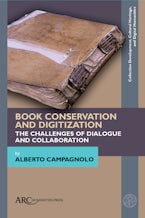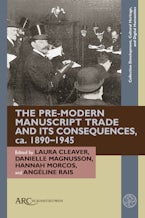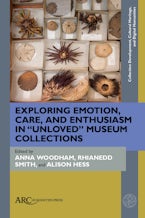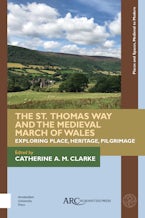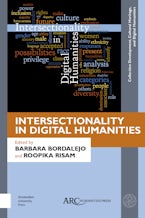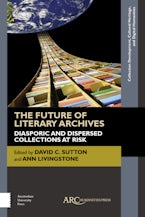- Home
- Collection Development, Cultural Heritage, and Digital Humanities
- antiques & collectibles
- computers
- literary criticism
- business & economics
- Book Conservation and Digitization
Book Conservation and Digitization
The Challenges of Dialogue and Collaboration
Series: Collection Development, Cultural Heritage, and Digital Humanities
316 Pages, Trim size: 6 x 9 in
- Hardcover
- 9781641890533
- Published: May 2020
- Paperback
- 9781802701708
- Published: February 2024
Introduction
Part One: Books as Objects and Their Digitization
Chapter 1: Understanding the Artifactual Value of Books
Chapter 2: Conservation and Digitization: A Difficult Balance?
Part Two Conservation and Digitization in Practice
Chapter 3: Conservation towards Large-Scale Digitization at the Vatican Library, Ángela Núñez Gaitán, Head of Conservation, Vatican Apostolic Library
Chapter 4: Large-Scale Digitization at The National Archives, Catt Baum, formerly Senior Conservation Manager—Digitization Services, The National Archives
Chapter 5: British Library/Qatar Foundation Partnership and the Digitization Project: A Case Study about Conservation Processes within Mass Digitization of Library Material, Flavio Marzo, formerly Conservation Manager, British Library/Qatar Foundation Partnership, British Library
Chapter 6: The Digitization of Medieval Western Manuscripts at the Wellcome Library, Stefania Signorello, Conservator, Wellcome Library
Chapter 7: Caring for the Object during Digitization of Written Heritage: The Strategy of the Herzog August Library Wolfenbüttel, Almuth Corbach, Head of Collection Care and Conservation, Herzog August Bibliothek
Chapter 8: The Great Parchment Book Project, Caroline De Stefani, Conservation Studio Manager, and Philippa Smith, Head of Collections, London Metropolitan Archives
Chapter 9: The Development of the Language of Bindings Thesaurus, Athanasios Velios and Nicholas Pickwoad, Directors, Ligatus Research Centre, University of the Arts London
Chapter 10: Spectral Imaging to Aid Preservation and Conservation of Cultural Heritage, Fenella G. France, Chief, Preservation Research and Testing Division, Library of Congress
Chapter 11: Multispectral Imaging for Special Collection Materials, Michael B. Toth, President and Chief Technology Officer, R. B. Toth Associates
Part Three: Conservators and Digitization Experts in Dialogue
Chapter 12: The Digitization of Manuscripts from the Point of View of a Book Conservator, Abigail B. Quandt, Head of Book and Paper Conservation, the Walters Art Museum
Chapter 13: Implementing Advanced Digital Imaging Research in Cultural Heritage: Building Relationships between Conservators and Computational Imaging Scientists, Melissa Terras, Professor of Digital Cultural Heritage, University of Edinburgh
Chapter 14: Coda: Concluding Thoughts on Digital Surrogates
Bibliography
Dr. Alberto Campagnolo (PhD, Ligatus, University of the Arts London 2015) is a trained book conservator and digital humanist. Formerly a CLIR postdoctoral fellow in Data Curation at The Library of Congress (Washington DC), he is now adjunct professor of Digital Humanities at the University of Udine, Italy
Il fulcro di questo lavoro risiede proprio nella fruttuosa collaborazione tra studiosi e professionisti che operano per la conservazione e preservazione, da un lato, e fruizione dall’altro del manoscritto e del libro antico. ~Simona Turbanti, Umanistica Digitale, 10 (2021): 417-21
[D]ecades-long efforts to digitize rare books and manuscripts have provided humanities researchers with vast resources that have enabled virtual access and opportunities for research. The timely publication of a volume of essays edited by Alberto Campagnolo provides a veritable master class in the work required to make these digital assets readily accessible online to scholars around the world.
~Nancy K. Turner, Manuscript Studies: A Journal of the Schoenberg Institute for Manuscript Studies 6, no. 2 (Fall 2021): 357-61
Digital platforms that provide remote access to archives and library material are becoming the norm.[...] Anyone who has been involved in the planning and execution of a digitization project, large or small, knows it to be otherwise. Therefore, the publication of Campagnolo’s book is exceptionally timely. It is a welcome reference text for all staff in an archive or library and should be widely read by those planners and decision-makers before embarking on such a project.
~Zoë Reid, Archives and Records: The Journal of the Archives and Records Association 42, no. 3 (2021): 329-30
Campagnolo’s work usefully offers a necessary grounding in the history of digitization efforts, some of the major projects that have set the current stage, and suggestions for modes of collaboration among curators, conservationists, preservationists, and other stakeholders to guide the field into the future.[...]I hope this volume will become a standard reading for students embarking on careers in cultural heritage institutions and for those embarking on their own institutional digitization projects. Likewise, I hope book historians, manuscript scholars, and other users of digital databases will take the time to read this volume, as a better understanding of the technical challenges our field faces will allow us to collaborate more fully.
~Eric Ensley, Speculum 98, no. 1 (January 2023): 228-30

